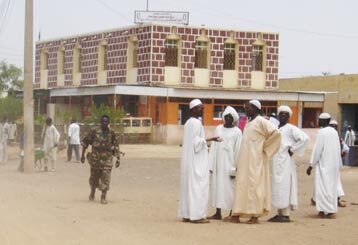The elitist Islamo-Arabist ruling class in Khartoum has always targeted women in the various wars it has waged against the Sudanese people, notably in regions populated by non-Arab ethnic groups. These wars have been conducted in the name of Islam as a religious philosophy and in the name of Arabism as a racial philosophy. Sudanese women continue to be the main victims of these wars.
Rape as a war weapon
In the last twenty years it has become common for government forces and pro-government militias to employ rape as a weapon, and the police consistently fail to investigate cases of rape even when the victim has reported the crime in person at a police station.
The recent war in the south of the country resulted in a whole region breaking away to become South Sudan – Africa’s newest state.
During this conflict the Islamist regime instructed pro-government forces to abduct and rape women in the name of fighting insurgency. And in relation to Darfur, the western region which saw the 21st century’s first genocide, former President Omar al-Bashir said that it was an honour for his followers to rape any woman or girl who was related to a member of an armed revolutionary group fighting his regime.
The Islamo-Arabist generals commanding the Sudanese army also promoted rape as part of their doctrine of war and encouraged militias like the Janjaweed to use it as a way of defeating rebellion. Rape thus became the norm for both government and pro-government forces operating in war-torn areas like Darfur, Blue Nile State and the Nuba Mountains.
The current conflict
Civil war broke out in Sudan on April 15th 2023 when the Rapid Support Forces (RSF) attacked government facilities in Khartoum and elsewhere. Tragically, the sisters, wives and daughters of government politicians and military strategists have suffered rape and inhuman treatment as a direct consequence of the government’s promotion of rape as a war weapon.
The RSF and its allied militia groups have even recorded videos documenting the sexual enslavement and other crimes suffered by women abducted by them in Khartoum and Darfur. Mimicking government tactics, the victims are relatives of those fighting the RSF.
In addition, there are documented cases of women being bombed and shelled while operating small businesses such as road-side tea shops and restaurants. Often these women were their family’s sole provider, and they lost their lives as their businesses were destroyed. Needless to say, generals on each side blamed the other side for these atrocities. A further great concern is the number of women who have killed themselves after suffering rape or the loss of their loved ones.
Medical emergencies
Lack of medical supplies during the civil war has caused the suffering and death of pregnant women, not just in the villages but also in the towns and cities. My own brother Ishag Yagoub tragically lost his dear wife in childbirth as hospitals ran short of supplies in East Darfur and government forces refused to allow life-saving humanitarian corridors to be established for the movement of medical aid.
In the months that the RSF besieged El Geneina, the capital of west Darfur, almost every sick person died. Human rights organisations have documented 15,000 deaths, mostly members of the Masalit tribe targeted by extremist Arab militia fighters supporting the RSF.
The generals believed that ‘ethnic cleansing’ would further their aims, and even the Masalit state governor was not spared, being murdered by RSF militia after the commander of the Central Reserve Police handed him over to them.
The number of women who lost their lives in El Geneina is not known.
After months of intensive fighting in Khartoum most of the residents fled to neighboring states while those who could afford to do so left the country altogether.
In April this year the UN Population Fund estimated that 219,000 pregnant women were in great danger with over 26,000 due to give birth within weeks while hospitals reported shortages of the basics they needed to run services. One state hospital in the central region of Sudan received over 170,000 pregnant women whose lives were put in great danger both by lack of medical supplies and by RSF attacks.
And the continuing fighting in Al-Fashir, the capital of North Darfur, and the shelling of the city’s only hospital, endangers the many people injured by RSF jet fighters and artillery, and also puts at risk expectant mothers and the future generation which they carry.


